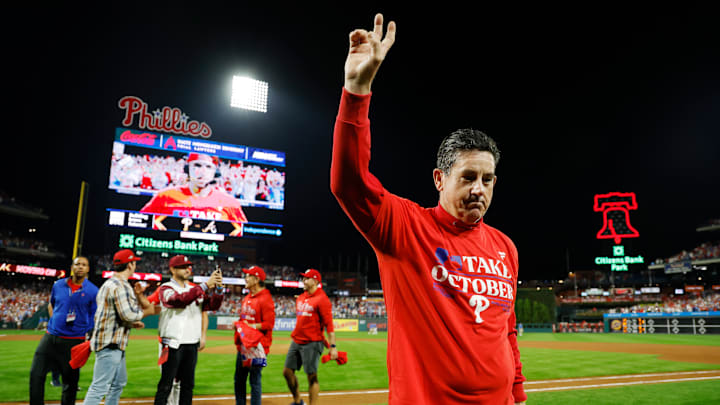The Hot Stove has been relatively cool to this point in the offseason. The Philadelphia Phillies' only major on-field move was re-signing Aaron Nola to a seven-year, $172 million deal in November. The Winter Meetings — which can be a catalyst for teams to begin making big moves — began on Sunday. The Phillies' only move since then was extending manager Rob Thomson through the 2025 season.
Since taking over for Joe Girardi in early June of 2022, Thomson has steered the club towards success. He is 154-118 since he took over at the helm in the regular season and has led the club to back-to-back postseason appearances. In both cases, the Phillies made deep playoff runs but ultimately fell short of their World Series goal.
Thomson has typically pressed the right buttons to help the club improve and succeed, however, he has received help from the front office and ownership and has benefitted from a star-studded roster. The Phillies have had a top-five payroll since the 2021 season. John Middleton has invested in the team and has made it clear he is willing to spend to win.
How long can a high payroll sustain an organization? It varies from team to team, but typically it's not a wise choice to hover into the luxury tax thresholds for an extended period. While monetary penalties start to set in, loss of draft picks or forfeiture of draft capital could impact a club's long-term health. That brings into question what the championship window is for this Phillies core.
Phillies staying level-headed with current luxury tax status
The first luxury tax threshold for the 2024 season sits at $237 million. The Phillies will exceed that threshold prior to the beginning of the season.
Destiny Lugardo of Phillies Nation put out a comprehensive breakdown of the club's projected payroll heading into the upcoming season. Between guaranteed contracts, arbitration projections, pre-arbitration raises, and other expenses, it's likely the Phillies will be just around $4 million short of the second luxury tax tier and about $24 million to play with before reaching the more penal third tier.
This doesn't give the club much wiggle room when it comes to other signings or in-season salary increases. That's not to say that Middleton and company would not surpass the second or third tier — they will if the move gives the team a shot at a trophy. The money is just one part of going into the higher tiers of the luxury tax. If the Phillies finish in the third tier of the tax threshold, their highest draft pick gets moved back ten spots.
That is a significant punitive measure if a team wants to sustain long-term success. The Phillies will not likely want to linger in that range for more than a few years. This could influence the front office to go big or go home in the next two or three years while a bulk of the team's core remains intact.
NEXT: The Phillies' aging core will determine their World Series window.
